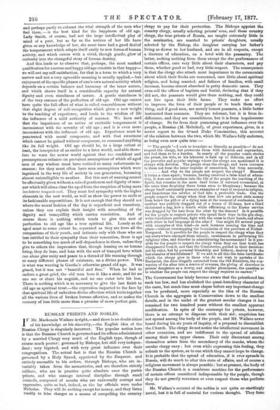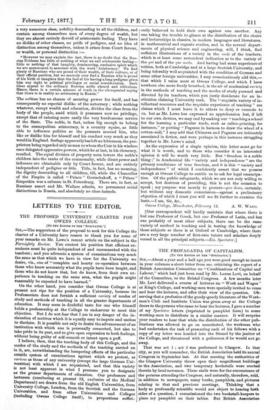RUSSIAN PRIESTS AND NOBLES.
IF Mr. Mackenzie Wallace is right,—and there is no doubt either of his knowledge or his sincerity,—the English idea of the Russian Clergy is singularly incorrect. The popular notion here is that the Russian Church is governed and its offices administered by a married Clergy very much of the English type, though of course much poorer; governed by Bishops, but still very indepen- dent; very bigoted, and with very great influence over their congregations. The actual fact is that the Russian Church is governed by a Holy Synod, appointed by the Emperor, and entirely amenable to his orders, through Bishops, who are in- variably taken from the monasteries, and are therefore strictly celibate, who are in practice quite absolute over the parish priests, and who manage internal discipline through small councils, composed of monks who are universally corrupt and oppressive, quite as bad, indeed, as the lay officials were under Nicholas. They will do nothing except for money, and they listen readily to false charges as a means of compelling the country clergy to pay for their protection. The Bishops appoint the cbuntry clergy, usually selecting priests' sons, and these country clergy, the true priests of Russia, are taught extremely little in the seminaries, are married to priests' daughters, usually selected by the Bishop, the daughter carrying her father's living as dower to her husband, and are in all respects, except a tincture of education, on a level with the peasantry. The latter, seeking nothing from them except the due performance of certain offices, care very little about their characters, and pay them, whether good or bad, very little respect. The consequence is that the clergy also attach most importance to the ceremonials about which their flocks are concerned, care little about spiritual religion, and being married, and fathers of families, with small incomes, become almost absorbed in petty domestic cares. They even sell the offices of baptism and burial, declaring that if they did not, the peasants would give them nothing, and they could not live upon their little farms. They make no effort to improve the lives of their people or to teach them any- thing, and if good men, are merely honest peasants, a little better instructed than common. They are tolerant, but it is from in- difference, and they are unambitious, but it is from hopelessness of change. So far from their possessing great influence over the people, a Russian (M. Melnikof), of great experience, gives, in a secret report to the G•snd Duke Constantine, this account of the relation between the two, which Mr. Wallace fully endorses, as being even now quite true The people '—I seek to translate as literally as possible—' do not respect the clergy, but persecute them with derision and reproaches, and feel them to be a burden. In nearly all the popular comic stories the priest, his wife, or his labourer is held up to ridicule, and in all the proverbs and popular sayings where the clergy are mentioned it is always with derision. The people shun the clergy, and have recourse to them not from the inner impulse of conscience, but from necessity.
And why do the people not respect the clergy ? Because it forms a class apart ; because, having received a false kind of educa- tion, it does not introduce into the life of the people the teaching of the Spirit, but remains in the mere dead forms of outward ceremonial, at the same time despising these forms even to blasphemy; because the clergy itself continually presents examples of want of respect to religion, and transforms the service of God into a profitable trade. Can the people respect the clergy when they hear how one priest stole money from below the pillow of a dying man at the moment of confession, how another was publicly dragged out of a house of ill-fame, how a third christened a dog, how a fourth while officiating at the Easter service was dragged by the hair from the altar by the deaeon ? Is it possible for the people to respect priests who spend their time in the gin-shop, write fraudulent petitions, fight with the cross in their hands, and abuse each other in bad language at the altar ? One might fill several pages with examples of this kind—in each instance naming the time and place—without overstepping the boundaries of the province of Nizhni- Novgorod. Is it possible for the people to respect the clergy when they see everywhere amongst them simony, carelessness in performing the religious rites, and disorder in administering the sacraments? Is it pos- sible for the people to respect the clergy when they see that truth has disappeared from it, and that the Consistories, guided in their decisions not by rules, but by personal friendship and bribery, destroy in it the last remains of truthfulness? If we add to all this the false certificates which the clergy give to those who do not wish to partake of the Eucharist, the dues illegally extracted from the Old Ritualists, the con- version of the altar into a source of revenue, the giving of churches to priests' daughters as a dowry, and similar phenomena, the question as to whether the people can respect the clergy requires no answer.'"
The Government has lately become aware that the priesthood has sank too low, and has abolished the quasi-hereditary character of the caste, but much time must elapse before any important change can be produced, more especially as the idea of the Russian Church in the aggregate is Conservatism down to the smallest details, and in the midst of the greatest secular changes it has remained for two hundred years without the smallest apparent modification. In spite of the contempt for priests, however, there is no attempt to dispense with their aid ; scepticism has not spread among the body of the people, and Mt. Wallace never heard during his six years of inquiry, of a proposal to disestablish the Church. The clergy do not notice the intellectual movement in other countries, and are indifferent to the spread of nihilism among their own upper classes. Their only discontent among themselves arises from the ascendancy of the monks, whom the secular clergy envy ; but even while expressing this feeling, they submit to the system, as to one which they cannot hope to change. It is probable that the spread of education, if it ever spreads in Russia, will do much to alter this state of affairs, and of course :a religious movement is always possible ; but at present, the body of the Russian Church is a cumbrous machine for the performance of certain offices considered indispensable by the people, though they do not greatly reverence or even respect those who perform them.
Mr. Wallace's account of the nobles is not quite so startlingly novel, but it is full of material for curious thought. They form a very numerous class, nobility descending to all the children, and contain among themselves men of every degree of wealth, but they are almost entirely devoid of aristocratic feeling. They have no dislike of other classes, no pride of pedigree, and no idea of distinction among themselves, unless it arises from Court favour, or wealth, or personal distinction
However we may explain the fact, there is no doubt that the Rus- sian Noblesse has little or nothing of what we call aristocratic feeling— little or nothing of that haughty, domineering, exclusive spirit which we are accustomed to associate with the word Aristocracy.' We find plenty of Russians who are proud of their wealth, of their culture, or of their official position, but we scarcely ever find a Russian who is proud of his birth or imagines that the fact of his having along pedigree gives him any right to political privileges or social consideration. Such ideas appear to the ordinary Russian noble absurd and ridiculous. Hence, there is a certain amount of truth in the oft-repeated saying that there is in reality no aristocracy in Russia."
The noblesse has no chance of securing power for itself, and has
consequently no especial dislike of the autocracy ; while nothing whatever, except wealth and education, divides the class from the body of the people, amid which it possesses now no privilege, except that of entering more easily the very burdensome service of the State. The noble, in fact, unless big enough to belong to the cosmopolitan aristocracy, is a country squire, as little able to influence politics as the peasants around him, who like or dislike him for himself and his conduct very much as they wouldin England. Serfage apparently has left no bitterness, the pro- prietors being regarded only as men to whom the Czar in his wisdom once delegated oppressive powers, which he at last, in his clemency, recalled. The equal division of property soon lowers the noble's children into the ranks of the commonalty, while direct power and influence are obtainable only by Court favour, and are entirely independent of pedigree or title. Title, in fact, has no meaning, the dignity descending to all children, till, while the Chancellor of the Empire is called " Prince " Gortschakoff, a " Prince " Krapotkin was a cabman in St. Petersburg. There are, in fact, as Russians assert and Mr. Wallace admits, no permanent social distinctions in Russia, and absolutely no class-hatreds.



































 Previous page
Previous page